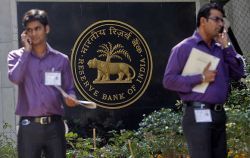 | « Back to article | Print this article |
 While talking about inflation, the Reserve Bank of India (RBI) appeared to be somewhat relaxed, which showed risks were balanced with expectations the new government would act on resolving supply-side bottlenecks and improving the fiscal position.
While talking about inflation, the Reserve Bank of India (RBI) appeared to be somewhat relaxed, which showed risks were balanced with expectations the new government would act on resolving supply-side bottlenecks and improving the fiscal position.
As a result, the forecast of eight per cent retail inflation by January next year looks achievable.
“The risks to the forecast of eight per cent CPI (Consumer Price Index)-based inflation by January 2015 remain broadly balanced,” the central bank said, while announcing its bi-monthly monetary policy review on Tuesday.
The favourable conditions made market participants hopeful the status quo on rates would be maintained for some time. However, risks to inflation could emerge at a later stage, and the central bank could resume its hawkish stance.
Cool mood in summer
Central bank sounds relaxed on inflation over expectations the Narendra Modi government will act on resolving supply-side bottlenecks.
RBI says risks to the central forecast of 8 per cent retail inflation by January 2015 remain broadly balanced RBI reduces the cap on export credit refinance to 32 per cent from 50 per cent of eligible export credit outstanding, as recommended by the Urjit Patel committee.
Market participants think the bigger challenge for RBI is achieving the target of 6 per cent inflation by Jan 2016
“The decision to hold rates reflects the current level of inflation, as well as expectations policy and administrative action from the government in the coming months will address inflation and boost growth,” said Chanda Kochhar, managing director and chief executive, ICICI Bank.
Market participants said achieving six per cent inflation by January 2016 would be a major challenge for the central bank. “We see a few risks lurking in the background. These may lead to price pressures remaining sticky by the year-end and force RBI to raise interest rates one more time.
Note that officials reiterated their target of bringing headline CPI inflation to eight per cent in January and six per cent by early 2016.
Amid all the dovish talk, therefore, the commitment to price stability remains,” HSBC said in a note to clients.
That the central bank will continue its vigil on inflation, despite a ‘mildly dovish’ statement, is also evident from the fact that for lending to banks, it is gradually shifting from the one-day repo to the term repo.
Also, it has reduced the cap on export credit refinance from 50 per cent of the eligible export credit outstanding to 32 per cent, as recommended by the Urjit Patel committee, set up to review the monetary policy.
“To move away from sector-specific refinance towards a more generalised provision of system liquidity, without preferential access to any particular sector or entity, RBI has decided to limit access to export credit refinance, while compensating fully with a commensurate expansion of the market’s access to liquidity through a special term repo facility,” the central bank said. Bankers say the move will increase their cost of funds.
“RBI is slowly pushing banks towards better management of treasuries and pushing us to borrow at term repo, rather than through the one-day window. For those accessing this window, the cost of funds will go up a little bit up,” said Arundhati Bhattacharya, chairperson, State Bank of India.
P Sitaram, chief financial officer, IDBI Bank, agreed. “The cost of funds may go up, but it is difficult to say what the exact impact will be, as it will depend on liquidity needs. We will see how much we end up using this window and, depending on all these factors, we will have to take a call on how to address the rising cost of funds.”